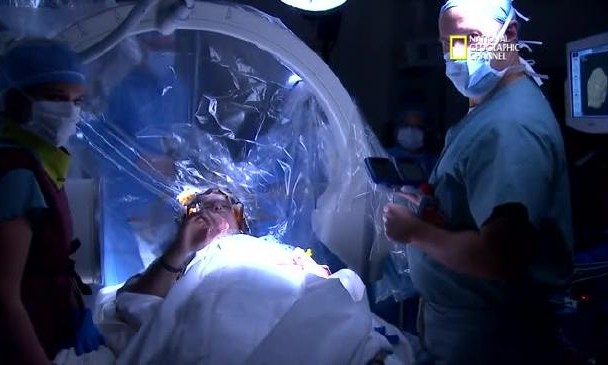HPU professor plays role in making broadcasting history

Neurosurgeons thread electrodes into the patient’s brain through holes in the skull during deep brain stimulation. Photo by: National Geographic
By Carly Delengowski // Staff Writer
Oct. 25 in a Cleveland operating room, a brain surgery was live broadcasted for the first time ever by National Geographic to 171 countries.
Joe Michaels, HPU Communications professor and former director of “The Today Show,” got to be part of the action by helping run and direct the production to ensure everything went smoothly.
The live broadcast entitled “Brain Surgery Live with Mental Floss” took place at Cleveland, Ohio’s University Hospitals Case Medical Center. It lasted for two hours and the whole production was successful, including the running commentary from the doctors.
“The surgeons went above and beyond,” Michaels said. “They were very accommodating.”
This iconic surgery was performed by neurosurgical team Dr. Jonathan Miller, Dr. Benjamin Walter and Dr. Jennifer Sweet. This broadcast made great medical advancements by raising awareness for Parkinson’s disease with National Geographic reporting over 16,000 related hits on Twitter.
“A lot of people aren’t aware that we have these therapies available and a lot of patients suffer needlessly,” Dr. Miller said. “Our goal is to publicize the problem and the solution.”
The patient, Greg Grindley, is a 49 year old former navy officer suffering from Parkinson’s disease, which for many years has crippled him with constant tremors that made it hard for him to speak or stand.
The operation is called deep brain stimulation. First, two holes were made in Grindley’s brain to insert probes. Though the surgery was painless, Grindley was awake and able to speak during the procedure so the doctors could know if they were accessing the right part of the brain.
Doctors pinpointed the “sweet spot” causing the tremors and were able to place electrodes where needed. Very few close ups of the brain were shown on the broadcast and as a result, the operation was almost entirely gore-free for the viewers.
The surgery has a high success rate of stopping tremors for five to seven years. By the end of the operation, Grindley held an iPad for the first time in his life and soon will even be able to ride a motorcycle again, a very exciting and emotional moment for Grindley and his family.
The distraction of the cameras was originally a concern, but the cameras and microphones were well placed and out of the doctor’s way. The crew used five cameras; one steady-cam, one hand-held, and three fully functional robo-cams, all properly sanitized before entering the operating room.
Michaels has experience in numerous prestigious productions such as the Olympics and The Today Show, though he says the live brain surgery is one of his favorites.
He mentioned that his favorite parts of the production were working with the crewmembers, many of whom he has worked with in the past and simply the fact that it was live.
“How can you not be excited about doing a live show? Michaels said. “Live shows are always exciting.”